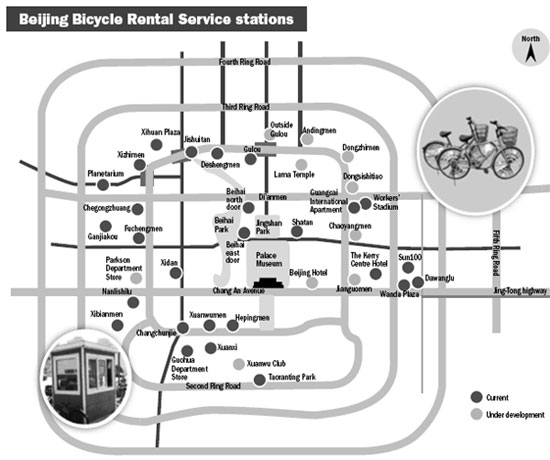


China has been called the Kingdom of Bicycles, yet due to rapid economic development and rising disposable incomes, urban residents increasingly turn their eyes to cars.
But a convenient and economical rental service may draw their attention back to the venerable and environmentally friendly vehicle: Getting a bicycle whenever and wherever they want in downtown Beijing and use it for one hour, one day, a week or a year - as long as they like, at a minimum price of 0.27 yuan a day.
Rental business
"Bicycles should not be forgotten in modern times as they can return to people's daily lives with new meanings, like a fashion statement and as a healthy, energy-saving and pollution-free means of transport," says Wang Yong, chairman of Beijing Bicycle Rental Services, a chain that started in 2005.
The business not only offers convenience to local residents but also provides fun for travelers, as riding bicycle around Tiananmen Square, or along modern streets and through traditional alleys will enable visitors to know the real Beijing - a capital city with long history and rich culture.
The company now has 31 outlets with 5,000 bicycles near key subway stations, bus stops and well-known travel sites. It plans to have 200 outlets with 50,000 bikes by the Beijing 2008 Olympic Games.
Customers can rent bikes at their convenience and return them to any company outlet. Its staff is responsible for maintenance and repair.
The rental requires a 400 yuan deposit, which is refunded when the bicycle is returned. "The longer you rent, the cheaper the rate we charge," says Wang, adding that for 100 yuan, a customer can use the bicycle for a year, equal to 8.3 yuan a month, or 0.27 yuan a day.
The company is still in the red as Wang's successful catering business continues to support it.
He currently spends more than 200,000 yuan a month on salaries, bicycle purchases, maintenance and rent. In its two years of operation, Wang has spent over 3 million yuan on the bicycle service.
With the requirements of the 2008 Olympics for green environment and transportation, the municipal government is encouraging the business.
A promotional event was held on August 19 by the Beijing Administration of Environmental Protection and Beijing Municipal Public Security Bureau, which called on residential communities, commercial sites and enterprises to collaborate with Bicycle Rental to expand outlets quickly and efficiently.
"The business is still regarded as a public welfare cause, but if its scale can be expanded to a certain level, the company can make a profit," says Zhou Xiaozheng, president of Sociology and Law Research Institute with Renmin University of China, who goes to work by bicycle every day and made a proposal to the government to establish public bike leasing services.
Wang is certainly bicycle aficionado. Even though he is a successful businessman, he still uses a bike for his daily transportation. "Beijing has been a city that ran on two wheels. And I am a genuine bicycle fan," Wang says.
The bicycle is still the traditional vehicle in major Chinese cities. Statistics from Zhou's research institute show China is No 1 in the world in bicycle production and purchases. In 2001, there were over 500 million bikes in the nation, or each at least one in every Chinese family, though the figure has declined in recent years.
Beijing is now estimated to have three million cars, with more than 1,000 new vehicles hitting the streets every day.
"In major cities like Beijing, Shanghai and Guangzhou, 80 percent of the carbon monoxide and 40 percent of the particulate matter come from auto emissions," says Wang. "For the sake of our city, people had better choose green transportation."
For four days, from August 17 to 20, Beijing restricted the number of motor vehicles on roads, based on license plate numbers, a test to measure the effect of reduced road traffic on air quality.
The test results clearly show that limiting the number of motor vehicles on roads had a positive effect on improving Beijing's air quality, reducing air pollutants by 15 to 20 percent and achieving level two air quality (air pollution indices between 50-100) for all four days, according to Du Shaozhong, deputy director and spokesman for the Beijing Administration of Environmental Protection.
"It made a remarkable improvement on traffic jams and air conditions from August 17 to 20," a citizen named Lu Qizeng says. "From this change, I found that 'moving in a green way' will offer profits to all of us."
Wang says that he plans to supply 1,000 free bicycles on September 22 -"World Car Free Day"- in order to provide convenience for people who give up driving.
(China Daily 09/03/2007 page8)













